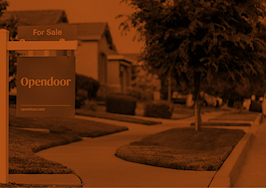In these times, double down — on your skills, on your knowledge, on you. Join us Aug. 8-10 at Inman Connect Las Vegas to lean into the shift and learn from the best. Get your ticket now for the best price.
Millennials are finally gaining on their older generational counterparts on the homeownership front, while Gen Z is beating out their parents, new data shows.
Long known for struggling with building wealth, millennials passed a significant milestone in 2022, with census data showing that 51.5 percent of millennials now own a home, according to a report released this week by Apartment List.
A separate study released Friday by Redfin found that roughly 30 percent of 25-year-olds currently own their homes — a rate higher than both millennials and Gen Xers, 28 percent and 27 percent of which respectively owned their homes when they were 25.
For Millennials, a generation long marked by financial insecurity, the milestone is significant, but they still have a long way to go before they catch up with their elders. Generation X, the generation born between the mid-1960s and about 1980, counts 69.7 percent of their members as homeowners, while 77.8 percent of baby boomers own homes as does 76.8 percent of the Silent Generation, those people born from 1928 to 1945.
It took millennials considerably longer to reach that milestone, too. By age 30, 42 percent of millennials owned their homes, compared to 48 percent of Gen X, 51 percent of baby boomers and nearly 60 percent of silents.
That’s due in part to the uneven economic challenges faced by millennials compared to older generations. Most millennials entered the workforce during the Great Recession — which suppressed homeownership across all generations — setting them down a path of career instability. The economic recovery that followed drew many millennials to job centers in major cities, where the price of a starter home has become more and more unsustainable over the ensuing years.
The COVID-19 housing market that ensued after 2020 has further complicated things for many millennials. While a considerable amount was able to finally purchase a home during 2020 and 2021 when mortgage rates were at 3 percent, the ensuing doubling of mortgage rates continued dropoff in the housing inventory, and the 40 percent skyrocketing of housing costs has further complicated things for the almost half of all millennials who do not yet own a home.
The same circumstances have created an even bleaker outlook for Generation Z. While some Gen Zers were able to take advantage of the pandemic’s ultra-low mortgage rates, those who didn’t may be left behind now that housing costs have shot up. A recent survey from Zillow found that a majority of Gen Zers believe they’d need to hit the lottery to ever be able to afford a home.
The Apartment List report found that a large portion of millennials who have found success in homebuying have done so outside of the typical coastal cities, with an emphasis on smaller, more affordable Midwestern cities.
Mike Opyd, owner and managing broker of RE/MAX Next in Chicago, said he’s noticed a trend of millennials moving to Chicago, which is the third-biggest city in the nation and considerably more affordable than major coastal cities, to get themselves established in their fields of choice before relocating to another city or out into the suburbs.
“Millennials understand the opportunity here,” he said. “They move here to really get established and then a lot of times they move out. They’ll come here to get their footing, they’ll buy a place, work here for a while, and then as they get a little older they move up in the ranks and might get the opportunity to move elsewhere.”
Opyd said he estimates the majority of his clientele are millennials, who he said tend to prioritize newer finishes and modern appliances when hunting for a home.
“There is a fixation with really wanting newer stuff,” said Opyd, who is a millennial himself. “I think it comes with our generation. We grew up with iPhone 1 and we get a new iPhone every damn year.”
Other agents similarly reported a preference for move-in-ready properties among millennials rather than fixer-uppers.
“What I see with millennial buyers across property types and price points is that they want the property done,” said Karen Mendelsohn Gould, a luxury real estate specialist with Compass in San Francisco. “Ideally they wouldn’t even paint.”













